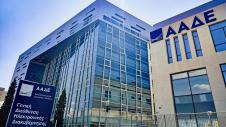The path is opening for new NPL securitizations to be launched by Greek banks in 2021, amidst strong demand for bad assets from foreign investors, according to credit rating agency Moody's.
In comments to Business Daily, Nondas Nicolaides, a Vice President and Senior Credit Analyst at Moody’s Investors Service, stresses that 2021 will be the year that banks in Greece will see their asset quality improve.
"We expect that Greek banks will be able to proceed with their NPL securitisations in 2021, without facing any major stumbling blocks given the sizeable investor appetite for such bad assets in the market from foreign companies," he says.
Strong demand for sour debt comes at a time when Piraeus Bank and National Bank are preparing to sell new loan packages (Vega and Frontier respectively) next year, while bank shares have booked impressive gains on the Athens Stock Exchange in the last month.
In 2020, Eurobank's Cairo project was completed, through which the bank succeeded in reducing its NPL ratio to 15%, while Alpha Bank's Galaxy project is in the final stretch, with the bank's management hoping to sign the final deal in December.
For its part, National Bank is working intensively on the Frontier securitization, which concerns the sale of more than 6 billion euros of bad debt, while Piraeus Bank is aiming to offload 7 billion euros of bad debt through the Phoenix and Vega transactions.
Problems for banks, however, are increasing due to the pandemic that is estimated to result in up to 10 billion euros of new NPLs, according to Nicolaides.
Banks generally expect that up to 25% of suspended loans, worth 20 billion euros, may end up defaulting, he explains, which means that the new NPLs can reach up to 5 billion euros.
"However, we would not be surprised to see this number increasing up to 10 billion euros, in line with the Bank of Greece’s estimate, given the extent of the pandemic’s implications on the Greek economy," says Nicolaides.
With an eye on balance sheets being weighed down by troubled loans in Europe, Brussels is now overcoming its reservations about bad banks and is now incorporating state-owned asset management companies into its strategic planning to protect the financial system.
This week, the European Commission is expected to unveil its strategic plan on national bad banks, according to the European Commissioner for Financial Stability, Financial Services and the Capital Market Union, Mairead McGuiness.
In Greece, the government's intentions on the issue have not been clarified, with the Finance Ministry sticking to the Hercules guarantee program, which will be extended in the near future.
The Hercules plan has contributed to the NPL securitizations and plays a pivotal role in cleaning their balance sheets up, explains Nicolaides, but the asset management company goes further.
"A potential formation of a bad bank that would make it easier for banks to further sell and reduce their NPLs in a systematic manner, would provide an additional relief to banks’ efforts to improve their asset quality and will accordingly help them manage in a balanced way their capital levels and Deferred Tax Credits," he says.
STELIOS BOURAS









